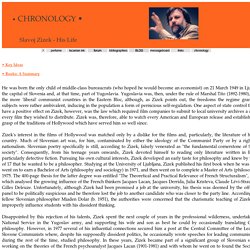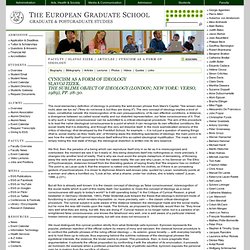

Higher Learning. The Pervert's Guide to Cinema: Part 1: "I Want to F*ck Mitch" Julian Assange & Slavoj Žižek part 2-2. Slavoj Zizek: Philosophy - Key Ideas. • Key Ideas • Books: A Summary He was born the only child of middle-class bureaucrats (who hoped he would become an economist) on 21 March 1949 in Ljubljana, the capital of Slovenia and, at that time, part of Yugoslavia.

Yugoslavia was, then, under the rule of Marshal Tito (1892-1980), one of the more 'liberal' communist countries in the Eastern Bloc, although, as Zizek points out, the freedoms the regime granted its subjects were rather ambivalent, inducing in the population a form of pernicious self-regulation. One aspect of state control that did have a positive effect on Zizek, however, was the law which required film companies to submit to local university archives a copy of every film they wished to distribute. Zizek was, therefore, able to watch every American and European release and establish a firm grasp of the traditions of Hollywood which have served him so well since. Cynicism as a Form of Ideology. The most elementary definition of ideology is probably the well-known phrase from Marx's Capital: "Sie wissen das nicht, aber sie tun es" ("they do not know it, but they are doing it").

The very concept of ideology implies a kind of basic, constitutive naïveté: the misrecognition of its own presuppositions, of its own effective conditions, a distance, a divergence between so-called social reality and our distorted representation, our false consciousness of it. That is why such a 'naive consciousness' can be submitted to a critical-ideological procedure. Zizek on Architecture and Aesthetics. Slavoj Zizek about dogmatic lacanian belief.